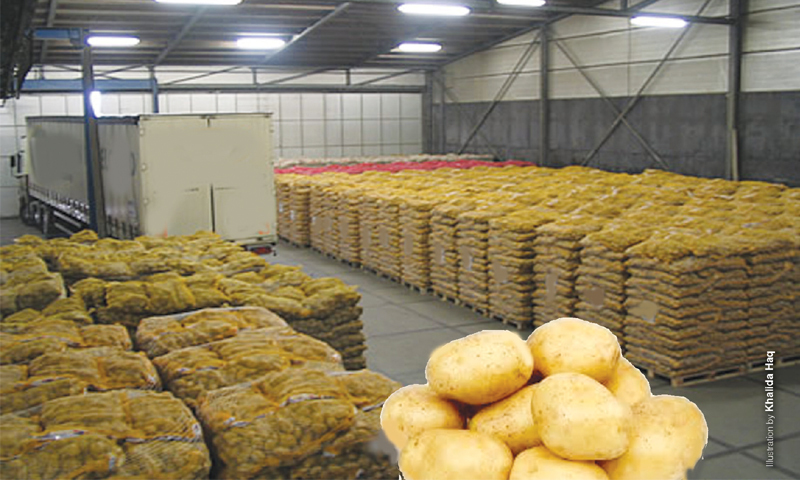THE government has taken meaningful steps to bring down potato prices, ending the impression among consumers of being helpless before the manipulators. The Economic Coordination Committee of the Cabinet, in its meeting on April 26, took two important decisions to restore consumer’s easy access to the popular vegetable. It imposed 25pc regulatory duty on the export of potato and allowed its free import from May 5 to July 31.
As a corollary to this, the FBR exempted 17pc sales tax, 5pc withholding tax and customs duty on the import of potatoes, not exceeding 200,000 tonnes in aggregate, during the specified period. Imports will obviously come from India. The ECC was informed by the ministry of national food security and research that hoarding and profiteering led to surge in local prices of the commodity. How far new stringent measures will prove effective remains to be seen.
Potato which was available in recent months at Rs30-40 per kg was, of late, selling at Rs60-70 per kg and despite the government’s best efforts to contain the hike including a deadline of April 24 set by Finance Minister Ishaq Dar to take action against the hoarders, its price did not come down. It was manifest that the profit-hungry market players had set their eyes on the figure of Rs100 as price of potato during the holy month of Ramazan. That is what alarmed Dar and his colleagues in the cabinet for that could mean a serious setback for the incumbent regime.
The real issue in the potato price hike was lack of action against greedy elements who had been buying stocks cheap from farmers and then exporting the commodity or storing it in cold storage to profit from artificially-created shortages
Retailers blame the wholesale dealers for keeping the prices high.
Even the government of Punjab – a province which produces 80pc of the commodity in the country -- had been warning traders and hoarders of tough actions if they failed to bring down the prices to its normal level that usually prevails at this time of the year, but they turned deaf ears to it. The provincial minister for food attributed the rise in prices to manipulation by hoarders.
There is no shortage of potato as such although frost had destroyed considerable quantities. And after taking into account the losses caused by frost, there does exist sufficient quantity of the commodity to meet the domestic needs. There are three seasons of potato cultivation: autumn, spring and summer.
The real issue is mismanagement and lack of action against greedy elements who had been buying the stock from farmers cheap and then exporting it or storing it in cold storages to profit from artificially created shortages.The government has no proper policy framework to protect producers or consumers from the excesses of the middleman.
According to All Pakistan Fruits Exporters, Importers and Merchants Association, the country’s potato exports which started in January had fetched around $9.9 million from a shipment of 33,000 tonnes. The export target of 350,000 tonnes for 2014 appears unlikely to be met. In 2013, about $60 million was earned from export of 200,000 tonnes of potatoes. The Association says that about half a million tonnes of potato has either been exported or smuggled to Iran and Afghanistan and from there to Central Asian states. As Russia has lifted ban on Pakistani potato, about 80,000 tonnes have been exported to Russia in the last four months and there are further orders of 20,000 tonnes yet to be fulfilled.
Potato import will reduce pressure on demand and compel hoarders to release their stocks which they have stored in cold storages to make a killing during shortages. However, there is little temptation now for hoarders to export the commodity after imposition of 25pc regulatory duty on the commodity’s exports.
Farmer Associates Pakistan, a representative body of rich farmers and landowners, says that the reason behind increase in potato prices is simple. This year the yield of potatoes was less than normal because of adverse weather and extension in winter season. Because of losses due to frost, there was re-sowing which ultimately increased the input costs.
The cost on all farm inputs at present, it says, is 17-19pc. This ultimately translates into a cumulative impact of 23-25pc on the price of agricultural products. So, if the government wants to make food affordable for common man it should do away with the taxes on inputs. Besides, there has been a 3.5pc reduction in areas under cultivation of potato as farmers were not getting good price for the last three years and they have shifted to some other crops.
Published in Dawn, Economic & Business, May 19th, 2014















































Dear visitor, the comments section is undergoing an overhaul and will return soon.